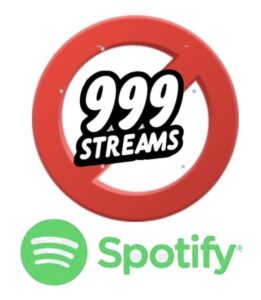Spotify, the world’s most popular music streaming service, has announced a new policy that will make many artists cry and laugh at the same time. Starting from Q1 2024, tracks will need to hit a whopping 1,000 streams before they start generating any royalties. That’s right, you’ll need to be streaming like it’s going out of style to make a penny.
But why did Spotify make this decision? And how will it impact the music industry and the listeners?

Behind the scenes, Spotify’s talking to record labels and distributors, trying to spin this as a noble cause to “demonetize” tracks that earn less than five cents a month. Why five cents, you ask? Well, in the grand scheme of Spotify’s royalty policy, five cents equals around 200 plays in the US. That’s right, you could buy a small piece of bubblegum or stream your heart out for hours.
Spotify claims that this policy will help them invest more in the music industry and support emerging artists. They say that by not paying for low-performing tracks, they can allocate more resources to the ones that generate more revenue and engagement. They also argue that this will encourage artists to create better quality music and promote their tracks more effectively.
But is this really the case? Or is Spotify just trying to save money and increase their profits at the expense of the artists?
As you can imagine, many artists and critics are not happy with Spotify’s new streaming policy. They argue that it simply doesn’t make any sense. And they’re right! If you can earn five cents from 200 streams, why would you hold off paying an artist for their hard work? Spotify is essentially saying that your music is worthless until it reaches a certain threshold.
Many artists have expressed their frustration and disappointment on social media and other platforms. Some have even decided to boycott Spotify and remove their tracks from the service. Others have called for more transparency and fairness in the way Spotify calculates and distributes royalties.
Critics have also pointed out the flaws and inconsistencies in Spotify’s logic. They say that Spotify is not really supporting emerging artists, but rather favoring the established ones who already have a large fan base and marketing budget. They also question how Spotify can claim to invest more in the music industry when they pay one of the lowest royalty rates among streaming services.
Some critics have even accused Spotify of violating the principles of net neutrality and creating a two-tier system where some tracks are more equal than others. They warn that this could lead to a loss of diversity and creativity in the music scene, as well as a loss of trust and loyalty from the listeners.

Spotify may be the king of streaming, but it’s also the king of stinginess. Maybe it’s time for artists and listeners to look for other options that value music more than money.
Fortunately, there are plenty of alternatives out there that offer better terms and conditions for both parties. For example, Bandcamp allows artists to set their own prices and keep 85% of the revenue. SoundCloud lets artists upload unlimited tracks and monetize them with ads or subscriptions. Apple Music pays an average of $0.01 per stream, which is more than double what Spotify pays.
For listeners, these alternatives also offer more benefits and features than Spotify. For example, Bandcamp lets you download the tracks you buy in any format you want, and also gives you access to exclusive content and merch from the artists. SoundCloud has a huge library of independent and underground music that you won’t find anywhere else. Apple Music has a better integration with iOS devices and Siri, and also offers more personalized recommendations and playlists.
Of course, these are not the only alternatives available. There are many more streaming services and platforms that cater to different genres, tastes, and preferences. The point is, you don’t have to settle for Spotify’s new streaming policy if you don’t agree with it. You can vote with your wallet and your ears, and support the artists and the music that you love.
Spotify’s new streaming policy is either a joke or a tragedy, depending on how you look at it. Either way, it’s not funny for the artists who rely on Spotify for their income. Spotify may have the largest market share and the most users, but it also has the most problems and the most complaints. It’s up to you to decide whether you want to stick with Spotify or switch. if you’re looking for a better way to stream music, there’s always an alternative. Just don’t forget to stream this blog post at least 1,000 times, or we won’t get paid! 😉


